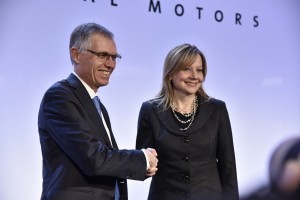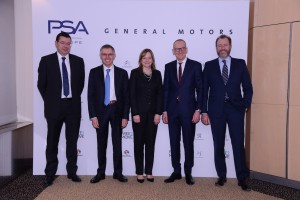
The ldeal between PSA Group and General Motors was sealed with a handshake between PSA chief Carlos Tavares and GM Chairman and CEO Mary Barra.
This story has been updated with additional information.
General Motors Co. and PSA Group have agreed to a deal in which the French automaker will take over GM’s long-struggling Opel/Vauxhall subsidiary, as well as the Detroit maker’s European financial operations for 2.2 billion euros or $2.5 billion.
For GM, deal ends the company’s long history in Europe, stretching back to the Opel acquisition in 1929. However, it doesn’t completely end the massive losses that have piled up for Opel since it last went into the black in 1999. As part of the deal, GM will retain all of Opel Vauxhall’s pension liabilities and is expected to take a $4 billion to $4.5 billion one-time charge once the deal closes later this year.
While it ends GM’s long legacy as a truly global automaker, the sale will allow the Detroit carmaker to more fully focus on its two key markets: the U.S. and China. For PSA – which pulled out of the North American market a quarter century ago, the acquisition transforms it into Europe’s second-largest automaker, with a 17% market share, behind only the Volkswagen Group.
“We are proud to join forces with Opel/Vauxhall and are deeply committed to continuing to .develop this great company and accelerating its turnaround,” said Carlos Tavares, chairman of the Managing Board of PSA.
“We respect all that Opel/Vauxhall’s talented people have achieved as well as the company’s fine brands and strong heritage. We intend to manage PSA and Opel/Vauxhall capitalizing on their respective brand identities,” Tavares said during a news conference announcing the widely expected deal. “We see this as a natural extension of our relationship and are eager to take it to the next level.”
(GM, PSA hoping to close Opel sale before Geneva Motor Show. Click Here for the story.)

PSA and GM executives are all smiles after the completing and announcing the $2.5 billion deal for Opel and Vauxhall.
GM had tried to sell off Opel once before, former CEO Fritz Henderson coming near to clinching a deal with a Russo-Canadian consortium headed by Toronto-based supplier Magna International shortly after the Detroit automaker emerged from its 2010 bankruptcy. But the executive team appointed to supervise GM as part of its federal bailout rejected the move and Henderson was instead forced out of the company.
Since his departure, three CEOs have struggled to pull together turnaround plans, and it appeared that 2016 might actually see German- based Opel and British-based Vauxhall finally crawl back into the black. But the Brexit vote scuttled that opportunity, and GM analysts feared the losses would continue. That appears to have led current CEO and Chairman Mary Barra to dust off the idea of a sale. This time, however, it was France’s PSA that offered a way out for GM.
For her part, Barra said the deal would speed up GM’s ongoing transformation. “We are very pleased that together, GM, our valued colleagues at Opel/Vauxhall and PSA have created a new opportunity to enhance the long-term performance of our respective companies by building on the success of our prior alliance,” Barra said.
The move, which makes sense for both parties, still leaves some unanswered questions, especially employees.
“The deal will give PSA far greater scale in Europe and opportunities to improve synergies there, although future headcount and production sites are likely to depend on how quickly efficiencies can be generated,” said IHS Markit, in a research note today after the deal was announced.
One of the main focuses of questions at the press conference following the announcement has been maintaining its current production footprint and job security in Europe. The chairman of PSA’s Managing Board, Carlos Tavares, has said that plans are not based on any changes, IHS noted.
However, he did add that it would require the buy-in of its workforce and management to achieve the efficiency levels required at sites across the region, using a similar blueprint to the one he has enacted at PSA over recent years, which will be used as a benchmark. This suggests that while there are no plans to close plants, they may need to do so if metrics are not hit, IHS added.
GM and PSA – the parent of the Peugeot and Citroen brands – have three active joint ventures in operation today.
“We are reshaping our company and delivering consistent, record results for our owners through disciplined capital allocation to our higher-return investments in our core automotive business and in new technologies that are enabling us to lead the future of personal mobility,” added Barra, who has brought GM closer to Silicon Valley-based companies such as Lyft and Cruise, which are promising to transform the car automotive business.
There have been some questions raised about the deal. Some observers wondered what it would mean for GM to no longer be a truly global company. And the loss of about 1.2 million annual sales could impact its broader economies of scale – potentially raising costs.
Some Opel products are marketed in the U.S. under other GM brand names – the Buick Cascada convertible being one example – so GM will now have to develop replacements.
(GM stock could benefit from Opel sales. Click Here for the story.)
For PSA’s part, Tavares said the impending merger of PSA and Opel/Vauxhall will allow it to gain substantial economies of scale and synergies in purchasing, manufacturing and R&D. Annual synergies are expected to reach 1.7 billion euros by 2026 – of which a significant part is expected to be delivered by 2020, accelerating Opel/Vauxhall’s turnaround.
Leveraging the earlier partnership with GM, which dates back to 2012, PSA expects Opel/Vauxhall to reach a recurring operating margin of 2% by 2020 and 6% by 2026, and to generate a positive operational free cash flow by 2020.
PSA, together with BNP Paribas, will also acquire all of GM European financial operations through a newly formed 50/50 joint venture that will retain GM Financial’s current European platform and team.
If PSA can turn things around at Opel, it could pay off for GM in the long-run. It holds warrants to purchase shares of the French company. The two automakers also expect to collaborate in the further deployment of electrification technologies and existing supply agreements, and PSA may potentially purchase hydrogen fuel cell systems from the GM/Honda joint venture announced earlier this year.
In connection with the Opel sale, GM will take a primarily non-cash special charge of $4 billion to $4.5 billion.
All of Opel/Vauxhall’s European and U.K. pension plans, funded and unfunded, with the exception of the German Actives Plan and selected smaller plans will remain with GM. The obligations with respect to the German Actives Plan and these smaller plans of Opel/Vauxhall will be transferred to PSA. GM will pay PSA 3 billion euros for full settlement of transferred pension obligations.
(PSA eyes big savings in potential Opel deal. Click Here for the story.)
Shares of PSA surged on news that the Opel deal was completed, but among the questions analysts want answers to is how the French maker will bring about the turnaround that long escaped GM. Among the challenges were commitments that government and union officials in Germany say they were given by PSA that the new management team won’t make major cuts in plants or employment levels.
Joseph Szczesny contributed to this report.
